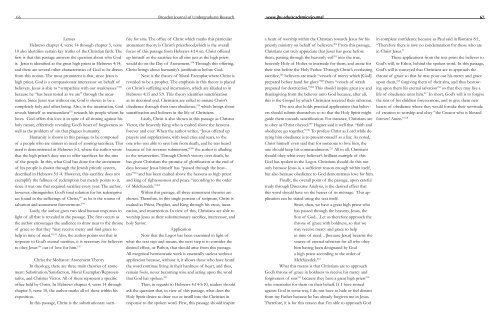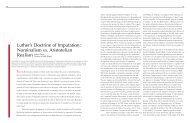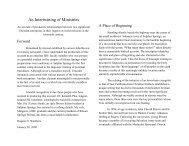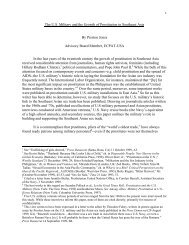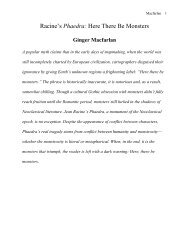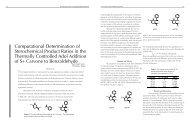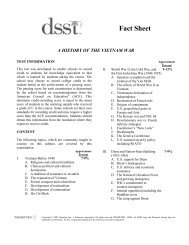64 Broaden Journal of Undergraduate Reseachwww.jbu.edu/academics/journal65not held by the priests of Aaron. As a result, as Psalm 1<strong>10</strong>says, Christ is proclaimed to be a priest forever because, justas Melchizedek, his priestly reign has no end. <strong>Jesus</strong>’ priesthoodholds no end because, as stated in <strong>Hebrews</strong> 4:15, he waswithout sin, and, therefore, could not remain dead. “<strong>Jesus</strong> istherefore high priest forever, because he lives forever to saveforever those who approach God through him. <strong>14</strong>7 Thus, theauthor of <strong>Hebrews</strong> “justified <strong>Jesus</strong>’ priesthood on the basis ofMelchizedek’s order.” <strong>14</strong>8<strong>Hebrews</strong> 5:7 – “In the days of his flesh, <strong>Jesus</strong> offered upprayers and supplications, with loud cries and tears, to theone who was able to save him from death and he was heardbecause of his reverent submission.”<strong>Hebrews</strong> chapter 5, verses 7 through 8 begin toidentify the second qualification which Christ possesses to becounted as high priest, his solidarity with the people. <strong>14</strong>9 <strong>The</strong>phrase “In the days of his flesh,” 150 acknowledges again that<strong>Jesus</strong> is able to sympathize with human weakness becausehe “participated fully in the human condition.” 151 Earlier inhis book, in chapter 2, the author of <strong>Hebrews</strong> wrote, “Sincetherefore the children share in flesh and blood, he himselflikewise partook of the same things…<strong>The</strong>refore he had to bemade like his brothers in every respect.” 152 <strong>The</strong> author, therefore,says that <strong>Jesus</strong> is perfectly like his brothers and sisters,and, as a result, is able to intercede for them perfectly. <strong>The</strong>phrase “In the days of his flesh” 153 also does not infer thatChrist forsook his humanity upon sitting at the right hand ofGod, but that he retains his flesh in glory, thus enabling him tosympathize with Christians forever more. 154<strong>The</strong> rest of verse 7 is rather difficult to interpretbecause of the ambiguities given from the author’s writing. 155Several scholars disagree, but I completely affirm Bruce andLong’s principle that this text can only be fully understoodin light of <strong>Jesus</strong>’ actions in the Garden of Gethsemane thenight before his crucifixion. I believe this to be the case becauseof the fact that the author is constantly alluding to theDay of Atonement in his exposition of the high priest, andthe crucifixion is, in some ways, the Day of Atonement forChristians. 156 <strong>The</strong>refore, under a logical understanding of thecontext of the author’s argument, it is responsible to interpretthe following lines in light of Gethsemane, an important segmentof the passion of <strong>Jesus</strong>.<strong>The</strong> author says, “<strong>Jesus</strong> offered up prayers and supplications…”157 the reader should note that the same verbfor the high priest’s offering of gifts and sacrifices for sins in<strong>Hebrews</strong> 5:1, which was determined as pointing towards theDay of Atonement, is used here. <strong>The</strong> use of προσφέρω isan intentional parallel made by the author between <strong>Jesus</strong> andthe high priest. In essence, <strong>Jesus</strong>’ prayers “were a sacrificialoffering” 158 At this point, it is necessary to unpack the text inconjunction with accounts of Gethsemane.<strong>Hebrews</strong> says that <strong>Jesus</strong> offered prayers “with loudcries and tears” 159 When going to pray in the Garden of Gethsemanethe night before his execution, <strong>Jesus</strong> told his disciples,“My soul is deeply grieved.” 160 As he prayed, <strong>Jesus</strong> was sogrieved and dismayed at his impending crucifixion that Luke22:44 records, “[a]nd being in agony he prayed more earnestly;and sweat became like great drops of blood falling down tothe ground” (ESV). All the while, Christ was offering theseprayers “to the one who was able to save him from death.” 161This is an obvious reference to God the Father, and is explicitlyidentified by <strong>Jesus</strong>’ prayer in the garden when he addresseshis prayers to “Abba, Father.” 162What’s more is that <strong>Hebrews</strong> records that <strong>Jesus</strong> washeard “because of his reverent submission.” 163 Christ prayed,“Father, if you are willing, remove this cup from me. Nevertheless,not my will, but yours, be done” 164 <strong>The</strong> cup which<strong>Jesus</strong> referred to was the cup of God’s righteous judgmentagainst sin. 165 Although Christ asked if there was another wayto atone for sin, he was submissive, or obedient, to God’s willin saying, “not my will, but yours, be done.” 166 Thus Christ’sprayers were a sacrificial offering where he essentially offeredup his own body as the atoning sacrifice in submission to thewill of the Father.It is for these reasons why he was heard. It could beargued, rather poorly I might add, that Christ was not heardbecause he still tasted death, however, <strong>Jesus</strong> was indeed heard,and saved from death through God raising him from thedead. 167 Because <strong>Jesus</strong> “offered his faithful life to the Fatherin his dying body on the cross” 168 after his humble submissivenessdemonstrated in Gethsemane, God was pleased andsatisfied with his sacrifice, 169 and did, indeed, “save him fromdeath.” 170<strong>Hebrews</strong> 5:8 – “Although he was a Son, he learned obediencethrough what he suffered;”<strong>Jesus</strong> is again identified as the Son of God in <strong>Hebrews</strong>5:8, where the author also presents the surprising argumentthat “[<strong>Jesus</strong>] learned obedience through what hesuffered.” This is not proposing that <strong>Jesus</strong> “came to knowsomething he did not know before.” 171 Instead, this merelymeans that <strong>Jesus</strong> exemplified obedience to the will of God supremely172 in his obedience “to the point of death, even deathon a cross.”Bruce asserts that the author may have had Isaiah50:5-6 in mind when writing chapter 5 verse 8. 173 <strong>The</strong> text says,“<strong>The</strong> Lord God has opened my ear, and I was not rebellious;I turned not backward. I gave my back to those who strikeand my cheeks to those who pull out the beard; I hid not myface from disgrace and spitting” (ESV). In the passage, “theServant’s eagerness to pay heed to the voice of God exposeshim to ridicule and ill-treatment, but he accepts this as somethinginseparable from his obedience.” 174 Thus, the sufferingsof Christ were necessary in consequence to his obedience. 175<strong>Hebrews</strong> 5:9 – “and having been made perfect, he became thesource of eternal salvation for all who obey him,” (NRSV)<strong>The</strong> term “made perfect,” much like the term“learned obedience” found in <strong>Hebrews</strong> 5:8, does not implythat Christ lacked any perfection in himself. As 2 Corinthians5:21 affirms, Christ “knew no sin” (ESV), and as a result, hewas perfect even from before time in his eternity. 176 Instead,Christ being made perfect means that he as made “fully qualifiedto be the Savior and <strong>High</strong> <strong>Priest</strong> of his people.” 177 Thisphrase “reflects upon the sufferings by which he was broughtto the goal appointed for him by God, through which he becamea perfect high priest.” 178<strong>The</strong> effect of this statement is demonstrated by theauthor’s main verb, ἐγένετο, which signifies that <strong>Jesus</strong> himself“became” the “source of eternal salvation.” <strong>Jesus</strong>, therefore,became the source of salvation “because he obtained righteousnessfor us before God, having removed the disobedienceof Adam” 179 through his “obedience through what hesuffered.” 180 Isaiah 45:17 can be referenced here 181 saying, “ButIsrael will be saved by the Lord with an everlasting salvation”(NIV). In understanding that the audience was most likelyJewish Christians who were being tempted to return to Judaism,the author affirms here through <strong>Hebrews</strong> 5:9 that <strong>Jesus</strong> isthe eternal salvation of which God had promised long ago. Itis important to note that the salvation found in Christ’s sufferingsis not eternal merely because it is everlasting, but that “itis true, heavenly, and not human-made.” 182Also, the eternal salvation given in Christ is “forall who obey him.” <strong>The</strong> author uses πᾶσιν, meaning “all”or “every” to convey who the eternal salvation is intendedfor. This term reveals that all who are obedient to Christ arepartakers in his salvation 183 and emphasizes the importance ofobeying Christ, who was himself obedient. 184 Not only is suchobedience necessary, it is also appropriate that the ones whom<strong>Jesus</strong> saves should obey him. 185 For the author of <strong>Hebrews</strong>,much like Paul, it is understood that “faith and obedience gotogether,” 186 or, in other words, obedience is bred from faith.As a result, an individual who professes to have faith in Christwill prove faith through obedience to Christ. <strong>Jesus</strong> even saidthis himself in John <strong>14</strong>:15, “If you love me, you will keep mycommandments” (ESV).<strong>Hebrews</strong> 5:<strong>10</strong> – “…having been designated by God a highpriest according to the order of Melchizedek.” (NRSV)<strong>The</strong> author again alludes to Psalm 1<strong>10</strong>:4 in the concludingsentence of this passage much like he did in verse6. 187 He reminds the readers, once again, of the legitimacy ofChrist’s priesthood by referring to the divine acclamation 188 bywhich Christ was chosen by God “a high priest according tothe order of Melchizedek.” <strong>The</strong> purpose of this allusion is to“reaffirm God’s appointment of <strong>Jesus</strong> as <strong>High</strong> priest,” 189 butto also serve as a connection between <strong>Jesus</strong>’ priest hood withhis saving work which was described in <strong>Hebrews</strong> 5:7-9. 190Context: AfterImmediately following this passage is the author’sfamous warning against apostasy in chapter 6. <strong>The</strong> reason thatthe author continues in his letter to make this exhortation isbecause in <strong>Hebrews</strong> 4:<strong>14</strong>-5:<strong>10</strong>, he has excellently given hisaudience the reason why it is unthinkable to turn back to Judaismfrom their professed faith in Christ. His argument essentiallyasks his readers why they would turn from the obviouslysuperior priesthood and subsequent atonement of <strong>Jesus</strong> to thecompletely lacking priestly system of the Jews. <strong>The</strong> author alsouses this passage to introduce the author’s fantastic argumentof <strong>Jesus</strong> belonging of the order of Melchizedek in his priesthood,which he fully explains in <strong>Hebrews</strong> 7.
66 Broaden Journal of Undergraduate Reseachwww.jbu.edu/academics/journal67Lenses<strong>Hebrews</strong> chapter 4, verse <strong>14</strong> through chapter 5, verse<strong>10</strong> also identifies certain key truths of the Christian faith. <strong>The</strong>first is that this passage answers the question about who Godis. <strong>Jesus</strong> is identified as the great high priest in <strong>Hebrews</strong> 4:<strong>14</strong>,and there are several other characteristics of God to be drawnfrom this notion. <strong>The</strong> most prominent is that, since <strong>Jesus</strong> ishigh priest, God is a compassionate intercessor on behalf ofbelievers. <strong>Jesus</strong> is able to “sympathize with our weaknesses” 191because he “has been tested as we are” through the incarnation.Since <strong>Jesus</strong> was without sin, God is shown to be acompletely holy and other being. Also, in the incarnation, Godreveals himself as transcendent 192 towards his people whom heloves. God offers this love is in spite of all sinning against hisholy nature, effectively revealing God’s heart of forgiveness aswell as the problem of sin that plagues humanity.Humanity is shown in this passage to be composedof a people who are sinners in need of atoning sacrifices. Thisneed is demonstrated in <strong>Hebrews</strong> 5:1, where the author wrotethat the high priest’s duty was to offer sacrifices for the sinsof the people. In this, what God has done for the atonementof his people is shown through the Jewish priestly system,described in <strong>Hebrews</strong> 5:1-4. However, this sacrifice does notexemplify the fullness of redemption but merely points to it,since it was one that required sacrifice every year. <strong>The</strong> author,however, distinguishes God’s final solution for his redemptiveact found in the sufferings of Christ, 193 as he is the source ofsalvation and atonement forevermore. 194Lastly, the author gives two ideal human responses inlight of all that is revealed in the passage. <strong>The</strong> first occurs asthe author encourages the audience to draw near to the throneof grace so that they “may receive mercy and find grace tohelp in time of need.” 195 Also, the author points out that inresponse to God’s eternal sacrifice, it is necessary for believersto obey <strong>Jesus</strong> 196 out of love for him. 197Christ the Mediator: Atonement <strong>The</strong>oryIn theology, there are three main theories of atonement:Substitution/Satisfaction, Moral Exemplar/Representative,and Christus Victor. All of these represent a specificoffice held by Christ. In <strong>Hebrews</strong> chapter 4, verse <strong>14</strong> throughchapter 5, verse <strong>10</strong>, the author marks all of these within hisexposition.In this passage, Christ is the substitutionary sacrificefor sins. <strong>The</strong> office of Christ which marks this particularatonement theory is Christ’s priesthood,which is the overallfocus of this passage from <strong>Hebrews</strong> 4:<strong>14</strong> on. Christ offeredup himself as the sacrifice for all sins just as the high priestwould do on the Day of Atonement. 198 Through this offering,Christ brings about humanity’s justification before God.Next is the theory of Moral Exemplar where Christ isrevealed to be a prophet. <strong>The</strong> emphasis in this theory is placedon Christ’s suffering and incarnation, which are alluded to in<strong>Hebrews</strong> 4:15 and 5:9. This theory identifies sanctificationas its doctrinal end. Christians are called to imitate Christ’sobedience through their own obedience, 199 which brings aboutsanctification and holiness in the life of Christians.Lastly, Christ is also shown in this passage as ChristusVictor, the heavenly King who is exalted above the heavensforever and ever. When the author writes, “<strong>Jesus</strong> offered upprayers and supplications, with loud cries and tears, to theone who was able to save him from death, and he was heardbecause of his reverent submission,” 200 the author is alludingto the resurrection. Through Christ’s victory over death, hehas given Christians the promise of glorification at the end ofdays because <strong>Jesus</strong> himself has “passed through the heavens”201 and has been exalted above the heavens as high priestand king of righteousness and peace “according to the orderof Melchizedek.” 202Within this passage, all three atonement theories areshown. <strong>The</strong>refore, in this single portion of scripture, Christ isexalted as <strong>Priest</strong>, Prophet, and King through his cross, incarnation,and resurrection. In view of this, Christians are able toworship <strong>Jesus</strong> as their substitutionary sacrifice, intercessor, andholy Savior.ApplicationNow that the Logos has been examined in light ofwhat the text says and means, the next step is to consider thedesired effect, or Pathos, that should arise from this passage.All exegetical hermeneutic work is essentially useless withoutapplication because, without it, it allows those who have heardthe word continue living in their hardness of heart, and thus,remain fools, never becoming wise and acting upon the wordthat God has spoken. 203Thus, in regards to <strong>Hebrews</strong> 4:<strong>14</strong>-5:<strong>10</strong>, readers shouldask the question that, in view of this passage, what does theHoly Spirit desire to draw out or instill into the Christian inresponse to the spoken word. First, this passage should inspirea heart of worship within the Christian towards <strong>Jesus</strong> for hispriestly ministry on behalf of believers. 204 From this passage,Christians can truly appreciate that <strong>Jesus</strong> has gone beforethem, passing through the heavenly veil 205 into the true,heavenly Holy of Holies to intercede for them, and atone fortheir sins before the Holy Father. Through Christ’s everlastingsacrifice, 206 believers are made “vessels of mercy which [God]prepared before hand for glory” 207 from “vessels of wrathprepared for destruction.” 208 This should inspire great joy andthanksgiving from the believer unto God because, after all,this is the Gospel by which Christians received their salvation.<strong>The</strong> text also holds practical applications that believersshould submit themselves to so that the Holy Spirit mightguide them towards sanctification. For instance, Christians areto obey as Christ obeyed. 209 Hagner said it well that “faith andobedience go together.” 2<strong>10</strong> To profess Christ as Lord while denyinghim obedience is to present oneself as a liar. As noted,Christ himself even said that for someone to love him, theone should keep his commandments. 211 All in all, Christiansshould obey what every believer’s brilliant example of thisGod has spoken in the Logos. Christians should do this notonly because <strong>Jesus</strong> is, a sufficient reason enough within itself,but also because obedience to God demonstrates love for him.Finally, the overall point of the passage, upon carefulstudy through Discourse Analysis, is the desired effect thatthis word should have on the hearer of its message. This applicationcan be stated using the text itself:Since, then, we have a great high priest whohas passed through the heavens, <strong>Jesus</strong>, theSon of God…Let us therefore approach thethrone of grace with boldness, so that wemay receive mercy and grace to helpin time of need…[because <strong>Jesus</strong>] became thesource of eternal salvation for all who obeyhim having been designated by Goda high priest according to the order ofMelchizedek. 212What this means is that Christians are to approachGod’s throne of grace in boldness to receive his mercy andforgiveness of sins 213 because they have a great high priest 2<strong>14</strong>who intercedes for them on their behalf. If I have sinnedagainst God in some way, I do not have to hide or feel distantfrom my Father because he has already forgiven me in <strong>Jesus</strong>.<strong>The</strong>refore, it is for this reason that I’m able to approach Godin complete confidence because as Paul said in Romans 8:1,“<strong>The</strong>refore there is now no condemnation for those who arein Christ <strong>Jesus</strong>.”<strong>The</strong>se applications from the text point the believer toGod’s will, or Ethos, behind the spoken word. In this passage,God’s will is conveyed that Christians are to approach thethrone of grace so that he may pour out his mercy and graceupon them, 215 forgiving them of their sins, and thus bestowingupon them his eternal salvation 216 so that they may live alife of obedience unto him. 217 In short, God’s will is to forgivethe sins of his children forevermore, and to give them newhearts of obedience where they would forsake their servitudeof creation to worship and obey “the Creator who is blessedforever! Amen.” 218


